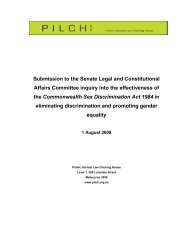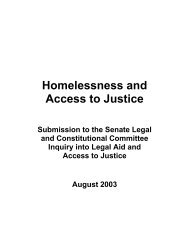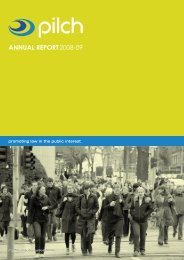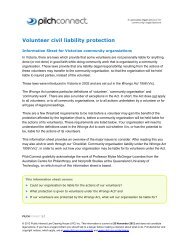Annual Report 2004 â 2005 - pilch
Annual Report 2004 â 2005 - pilch
Annual Report 2004 â 2005 - pilch
You also want an ePaper? Increase the reach of your titles
YUMPU automatically turns print PDFs into web optimized ePapers that Google loves.
The other significant feature of PILCH’s new vision statement is its express recognition<br />
of a role for PILCH in law reform, policy work and legal education. These activities<br />
are a central and increasing part of PILCH’s operations and are closely connected to<br />
PILCH’s role of linking clients and pro bono lawyers. Through the pro bono referral<br />
work, we are able to identify structural issues which significantly cause and compound<br />
marginalisation and disadvantage in our clients. We seek to collaborate with other<br />
advocates to highlight the impact of these issues on our clients and to press for<br />
appropriate reforms. Similarly, legal education has formed a greater part of PILCH’s<br />
activities in the last few years and we are committed to continuing training and<br />
education around issues related to pro bono, public interest lawyering and substantive<br />
legal issues affecting our clients. One aspect of this is our involvement with several<br />
universities in the development of public interest lawyering subjects at undergraduate<br />
and Masters levels.<br />
In its strategic plan, PILCH has also made an express commitment to innovation and<br />
creativity in pro bono. PILCH seeks to develop the capacity of the Victorian pro bono<br />
sector by involving more lawyers in pro bono work, extending the range of work which<br />
pro bono lawyers do and developing new models for pro bono service delivery which<br />
best serve clients. The HPLC is one recent example of PILCH’s capacity to incubate<br />
new ideas for improving access to justice. In the coming year, one of the key goals<br />
in PILCH’s strategic plan is to establish, with Liberty Victoria, a Human Rights Legal<br />
Centre, which will be dedicated to the protection, promotion and fulfilment of human<br />
rights in Australia. This is an exciting possibility which will involve community legal<br />
centres, community organisations, the private legal profession and universities.<br />
The goals in the PILCH strategic plan for the development of the pro bono sector have<br />
been produced in recognition of the fact that we are operating in an environment where<br />
there is a clear lack of affordable legal services and there are resulting high levels of<br />
unmet legal need. We have witnessed this through the significant growth in inquiries to,<br />
and referrals by, all of the Schemes administered by PILCH. The number of inquiries<br />
for pro bono assistance has risen by an average of 19% and the number of referrals to<br />
pro bono solicitors has also grown by an average of 31% in the last financial year. In the<br />
absence of adequate government funding of legal services, pro bono lawyers are being<br />
called on increasingly to satisfy the need for legal services of many individuals and<br />
community organisations. Given the cost of legal services, the courts are also seeing<br />
an increase in the number of self-represented litigants. These include people who are<br />
employed but whose incomes would not possibly stretch to cover the payment of legal<br />
fees. This growth in the demand for PILCH’s services evidences the need for Federal<br />
and State governments to dedicate greater resources to access to justice programs.<br />
Both levels of government must realise their obligation to the community and its<br />
members to guarantee access to justice and equality before the law.<br />
The capacity of PILCH to respond to the legal needs of the community, in circumstances<br />
where the government is failing to do so in an adequate manner, is dependent on the<br />
commitment and support of the private legal profession. PILCH is very fortunate to<br />
have received exceptional support from our members again this year. This support has<br />
been both financial and in-kind. It has also come from three new members to PILCH:<br />
Ebsworth & Ebsworth, the Law Institute of Victoria and Sparke Helmore. We would<br />
also like to encourage other law firms and corporate legal departments to take up<br />
membership of PILCH. PILCH would greatly appreciate your support and would be able<br />
to extend additional services to the community.<br />
We are also very pleased that the PILCH Board has again been stable, with many<br />
board members having been involved in PILCH for several years now. The board<br />
members have shown that they are very capable and active, particularly through their<br />
involvement in the strategic planning process.<br />
The staff and student volunteers at PILCH are also especially deserving of gratitude<br />
for their dedication and commitment. They are a talented group of people who work<br />
diligently to serve the community. We have had the benefit of increased staffing this<br />
year, which has allowed us to service the increased demands for pro bono assistance.<br />
We have also expanded our student volunteering program considerably to give more<br />
students the opportunity to participate in PILCH and experience how pro bono and<br />
public interest lawyering works.<br />
We also greatly appreciate the support and contribution which the Legal Practice Board,<br />
the Victorian government, the courts, the Law Institute of Victoria, the Victorian Bar,<br />
community legal centres, community organisations and many others provide to us.<br />
Emma Hunt and Paula O’Brien<br />
November <strong>2005</strong><br />
Emma Hunt –<br />
Co-Executive Director<br />
Paula O’Brien –<br />
Co-Executive Director<br />
4
















